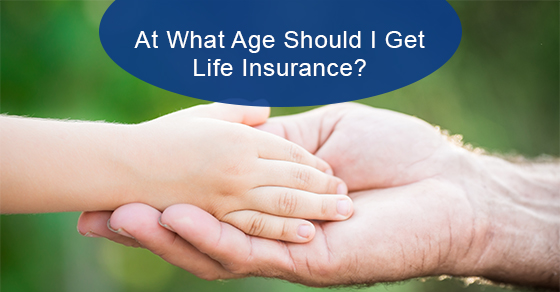At What Age Should I Get Life Insurance?
We all want to live a long, healthy, and happy life. However, experience has taught us that every birthday is not guaranteed, and everything can change in an instant. Losing a loved one is the most difficult for the people left behind. On top of sadness and grief, there may be financial losses and liabilities that now fall upon the shoulders of family members. Life insurance helps protect families from the shock and long-term financial burden that the sudden loss of a loved one may bring. The general policy is relatively straightforward. If you pass away, the insurance company will pay a lump sum to whomever you choose. In addition, some policies may include a cash value that you can access while you’re alive. At the end of the day, life insurance is essential if you have people in your life that you’d like to provide for after your passing. In general, life insurance serves to:
- Form an inheritance for dependents or beneficiaries
- Help pay for college or further education for children
- Cover funeral expenses
- Cover death and estate taxes
- Pay off any outstanding debts
So, when should you purchase life insurance? There is no easy answer to this question. In general, the younger you are when you buy life insurance, the lower your premium will be. A healthy, non-smoking 25-year-old would generally pay less than someone with a similar health profile but 20 years older. This article will discuss the pros and cons of waiting and at what age you should get a life insurance policy.
If You’re in Your 20s
As a young adult, having life insurance may not be at the top of your priorities. After all, you’re likely healthy, unmarried, and have no children or dependents. Plus, it’s an added expense that can be hard to afford if you are on a tight budget. So, should you get life insurance if you’re in your 20s?
Pro: Premiums Are Cheaper
Age is one of the factors that determines how much you pay for a life insurance policy. Generally, the younger and healthier you are, the lower your premium would be. Health problems are more likely to appear as you age, thus increasing your premium or even making you uninsurable.
Pro: Coverage is Easier to Find
You are often required to complete a health exam as part of the life insurance underwriting process. Since you’re less likely to suffer from health issues and, based on life expectancy averages, have a longer time left to live, insurers will likely approve your application.
Con: It’s an Added Expense
Life insurance will always be an added expense to your budget. If finances are tight, then you should consider how much coverage you can realistically afford in the short term.
Con: There May Be Better Financial Returns Elsewhere
The younger you are, the more time your investments have to grow due to compound interest. However, while investing in the market may yield greater returns, it will also carry more risk than the cash value of a permanent life insurance policy. We suggest that those in their 20s who are just beginning their career
start with term life insurance, which provides temporary coverage and can be renewed. Term life insurance policies could cover 10, 15, 20, or even 30 years, at which point you can get a more comprehensive policy when your finances have improved. In addition, you could get a small amount of permanent life insurance to receive more protection and set up a financial foundation while you are still young.
If You’re in Your 30s
As you get older, your financial circumstances will most likely change. In your 30s, you may have children, a mortgage, or increased living expenses. Overall, the advice is similar to those in their 20s. You should purchase as much life insurance as you are financially able. However, if you already have term life insurance, now is the time to consider updating your policy. Most term life insurance policies will allow you to convert to a permanent policy. It may be more expensive, but it provides lifelong protection from the financial impact of death. Even if your employer’s benefits include life insurance, purchasing your own is still a good idea. There’s no guarantee that your next employer will provide equal coverage as your last one. It’s best to consider your workplace insurance as an addition to your existing policy so that you always have something to fall back on.
If You’re in Your 40s, 50s, and Beyond
You’re likely prioritizing retirement or estate planning at this stage of your life. We recommend purchasing permanent life insurance so your insurance costs stay the same and you can generate dividends to increase your death benefit. Some insurance companies have age limits in their policies, which usually range from 60 to 85. An experienced insurance broker can help you find the right
policy with the protection you need. At
Oegema, Nicholson & Associates, our team of professional insurance brokers is here to help you find a
life insurance policy in Ottawa that suits your needs, budget, and lifestyle. We will work with you to identify risk factors, calculate your monthly budget, and secure a policy with ample coverage. For more information on how to start proactively protecting your loved ones even after you’re gone, call us at 613-704-7766 or
contact us here.


